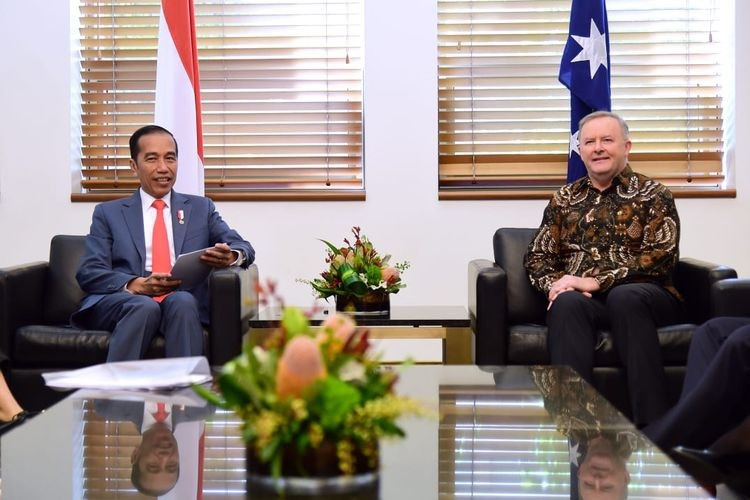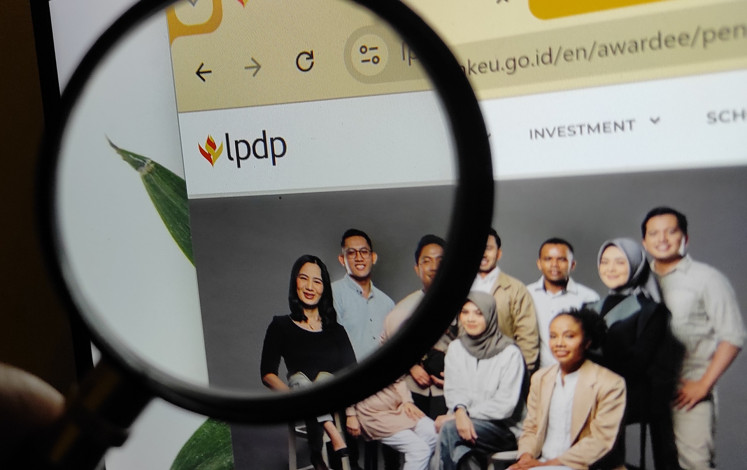Popular Reads
Top Results
Can't find what you're looking for?
View all search resultsPopular Reads
Top Results
Can't find what you're looking for?
View all search resultsNew, more multicultural Canberra govt bodes well for RI-Oz ties
Albanese's impending visit is likely to usher in a new era in Jakarta-Canberra ties, especially as regards the key campaign platforms that propelled him to election victory.
Change text size
Gift Premium Articles
to Anyone
 Courtesy call: On the sideline of his visit, President Joko “Jokowi” Widodo (left) receives then-Australian opposition leader Anthony Albanese at the Australian Parliament Building in Canberra on Feb. 10, 2020. Newly elected Prime Minister Albanese will visit Jakarta for talks with Jokowi soon. (Courtesy of/Presidential Secretariat Press Bureau)
Courtesy call: On the sideline of his visit, President Joko “Jokowi” Widodo (left) receives then-Australian opposition leader Anthony Albanese at the Australian Parliament Building in Canberra on Feb. 10, 2020. Newly elected Prime Minister Albanese will visit Jakarta for talks with Jokowi soon. (Courtesy of/Presidential Secretariat Press Bureau)
W
hen Anthony Albanese arrives in Jakarta on Sunday, he will not be just another Australian Prime Minister making Indonesia one of their first overseas stops after being elected. Albanese heads a government that will be vastly different in character, unlike anything we have ever seen in Canberra before.
Indonesia may want to pay heed to this and adjust in pursuing its relations with Australia.
Albanese led the Labor Party back into power after a nine-year hiatus, winning the May 21 election campaigning on stronger commitment to zero emissions and better treatment of Australia’s Aboriginal people. But more important than these and other new policies he will launch is the diversity of his Cabinet that, one way or another, will shape the character of his government.
We are not expecting a major departure in foreign policy from the previous government of Scott Morrison, but we can expect a different style, perhaps a more welcoming one, from a new government that is more diverse in its composition.
Albanese’s cabinet comprises 10 women, the largest number ever in an Australian cabinet, two Muslims and an Aboriginal. One notable appointment as far as Asia is concerned is that of Malaysian-born Penny Wong as foreign minister. Albanese’s Irish-Italian background also makes him the first Australian prime minister with a non-Anglo-Celtic heritage.
This will also probably be the most stable regime we have ever seen in Canberra for some time, with the Labor Party winning enough parliamentary seats to rule comfortably, instead of leading with a slim majority as in many recent governments.
While Australia celebrates after voting in a government with a composition that reflects the increasing cultural diversity of its society more closer than ever, Indonesia and other neighbors should welcome this change as the strongest signal yet of Australia’s intention and commitment to integrate better with the wider Asia-Pacific.
Just as important is Albanese’s commitment to carry out reforms on Australian Aboriginals’ place in society, a move that will help his country finally to come to terms with its ugly past.
A more multicultural, more feminine and more humble government, and a more stable one at that, surely bodes well for Australia’s relationship with any country, including its giant northern neighbor, Indonesia.
This is not to suggest that Indonesia-Australia ties are bad. On the contrary, they are at their historic best, especially after the 2019 signing of the Comprehensive Economic Partnership Agreement (CEPA), which gives a strong foundation for building stronger ties. There is always room for improvement and the diverse Albanese government will bring new color to our relationship.
CEPA was a milestone indeed, and the credit goes to former Australian premiers as well as past and present Indonesian presidents for working hard these last two decades or so to bring relations between the two countries to the current level.
Gone are the days when a single issue could undermine the entire relationship. East Timor was problematic to Indonesia-Australia ties for over three decades until Indonesia ended its occupation in 1999 and the territory became Timor-Leste.
Australia and Indonesia continued to have their differences since then, but each time they managed to contain the issue and resolve it without harming overall ties. Cases in point include Canberra’s export ban on its cattle, Jakarta executing Australian drug traffickers, Jakarta’s discovery that Australian intelligence had tapped the phones of president Susilo Bambang Yudhoyono and his staff, and Canberra’s handling of asylum seekers who arrived via Indonesia.
More spats will no doubt emerge from time to time that reflect the intensity of our ties and to test their strengths. Lest we forget, while there are issues that divide the two nations, there are many more issues that bring us together. One valuable lesson we take from the ups and downs in our past relations is that the leaders of both nations must work hard to manage them, and take nothing for granted.
The two countries still have to act on the CEPA agreement to deliver the intended benefits to their peoples.
There are also plenty of issues to discuss about our shared security in the region, including the South China Sea. This is an area where the two countries may not necessarily see eye to eye as regards perceived threats and how to deal with them, but this should not stop our leaders from bringing them up and find a common ground.
Even the two main issues that helped Albanese get elected, climate change and First Nations, while they might seem domestic, are also relevant to Indonesia.
Sadly, Indonesia’s commitment to net zero emissions more resembles Morrison’s plan and we need to change this. While we don’t have serious issues with indigenous population, we also have a huge problem with increasing intolerance, racism and the way we treat minority groups.
When Albanese flies to Jakarta on Sunday, we hope he will carry some of that cool June breeze from Australia.
***
The writer is a senior editor at The Jakarta Post.










